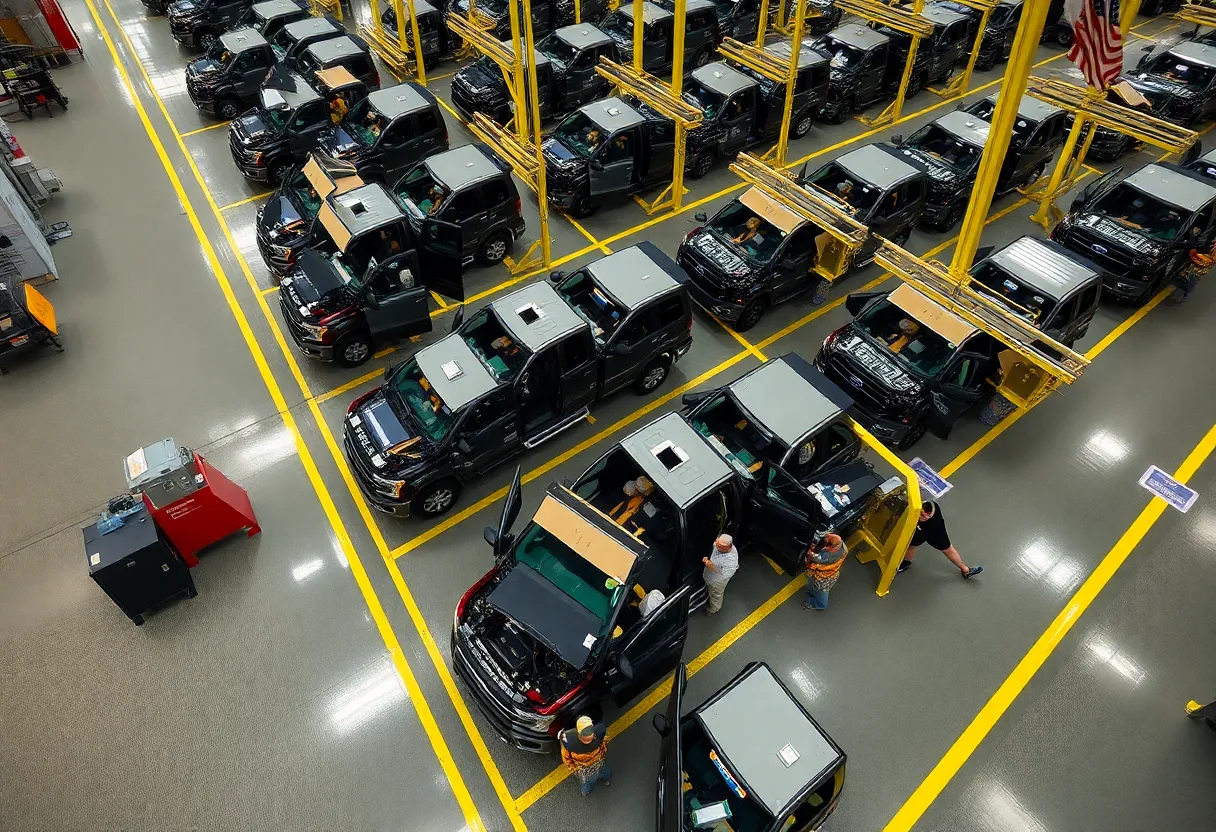Louisville, October 14, 2025
Ford Motor Company is experiencing significant production cuts at its Kentucky Truck Plant in Louisville due to a devastating fire at a key aluminum supplier. The incident is expected to result in a 10% reduction in quarterly output for several popular truck and SUV models, prompting concerns for thousands of workers and investors alike. As Ford seeks alternate sourcing solutions from global suppliers, the incident highlights vulnerability in just-in-time manufacturing practices within the automotive industry.
Ford’s Production Disruptions in Louisville After Supplier Fire
Louisville, KY – Ford Motor Company has significantly reduced production of five popular truck and SUV models following a major fire at a key aluminum supplier located in the Midwest. The Kentucky Truck Plant in Louisville has been hardest hit, with assembly lines temporarily paused for essential components, threatening to cut quarterly output by 10%.
Impact on Louisville Operations
The Kentucky Truck Plant, one of Ford’s largest facilities, assembles critical vehicles like the F-150, Explorer, and Expedition. The fire has disrupted the supply of aluminum parts, forcing a halt in these lines as the plant relies heavily on just-in-time manufacturing. Workers at the facility in Louisville, which employs thousands, are now facing uncertain schedules while the company scrambles to mitigate the effects. Production for these models has been scaled back across multiple sites, but Louisville’s plant bears the primary burden due to its central role in Ford’s truck manufacturing hub.
Financial and Market Repercussions
Analysts estimate that the incident could lead to a 10% dip in quarterly production for the affected lines, putting immediate pressure on Ford’s shares. The company’s stock has already shown volatility as investors assess the potential long-term costs. While exact figures remain preliminary, the disruption highlights ongoing challenges in maintaining steady output amid supply chain interruptions. Ford is exploring alternative sourcing from global vendors to resume full operations, but this shift may drive up costs due to expedited shipping and higher prices from secondary suppliers.
Broader Industry Implications
This event underscores vulnerabilities in the auto industry’s reliance on just-in-time manufacturing, where parts arrive precisely when needed to minimize inventory costs. A single supplier failure, like the Midwest fire, can ripple through global operations, halting assembly and delaying deliveries to dealers. Experts are calling for greater diversification in supply chains to build resilience against such disruptions. For Ford, the fire serves as a stark reminder of the risks tied to concentrated sourcing, especially for high-demand vehicles like trucks and SUVs that form a backbone of its revenue.
Recovery Efforts and Outlook
The company is working urgently to secure aluminum from international partners, with some production expected to restart in phases over the coming weeks. However, full recovery could take months, depending on the extent of the supplier’s damage and the efficiency of new arrangements. In Louisville, local economic impacts are a concern, as the plant contributes significantly to the region’s jobs and economy. Ford has not specified how long the pauses will last but is prioritizing safety and quality as lines come back online.
Background on the Supply Chain Issue
Just-in-time manufacturing has been a cornerstone of the automotive sector since the late 20th century, allowing companies like Ford to operate with lean inventories. Yet, events like natural disasters, fires, or geopolitical tensions expose its fragility. The Midwest supplier, vital for aluminum body panels and structural components, was engulfed in a blaze that destroyed key infrastructure. This incident follows a pattern of supply challenges that have plagued the industry, from semiconductor shortages to raw material delays, amplifying the need for strategic backups.
The disruption at the Kentucky Truck Plant comes at a pivotal time for Ford, as demand for trucks and SUVs remains strong amid a shifting market toward electric vehicles. While the company navigates this setback, it provides an opportunity to reevaluate supplier dependencies and invest in more robust alternatives. Stakeholders in Louisville and beyond will be watching closely as Ford works to stabilize its operations and regain momentum.
FAQ
What caused Ford to reduce production of its truck and SUV lines?
Which Ford facility is most affected by the supplier fire?
How much could quarterly production be impacted?
What steps is Ford taking to address the disruption?
What broader lessons does this incident highlight for the auto industry?
Key Features of the Production Disruption
| Feature | Description |
|---|---|
| Affected Models | Five truck and SUV lines |
| Primary Impact Site | Kentucky Truck Plant in Louisville |
| Cause of Disruption | Devastating fire at Midwest aluminum supplier |
| Projected Production Dip | 10% in quarterly output |
| Recovery Measures | Alternative sourcing from global vendors |
| Industry Implication | Vulnerabilities in just-in-time manufacturing highlighted |
Deeper Dive: News & Info About This Topic
HERE Resources
Ford Suspends SUV Production at Kentucky Truck Plant Due to Fire
Louisville Shoppers Embrace Store Brands as Grocery Prices Rise
Louisville’s Unemployment Rate Hits Five-Year Low Amid Manufacturing Boom
Bluegrass AI Secures $2.4 Million in Seed Funding
Ford Motor Company Expands Louisville Operations with Land Purchase
Ford Expands Operations with $41 Million Land Purchase in Louisville
Ford’s $41 Million Expansion Strengthens Louisville’s Automotive Sector
Brown-Forman Launches $400 Million Stock Buyback Amid Sales Challenges
Brown-Forman Announces $400 Million Stock Buyback to Boost Shareholder Value
Brown-Forman Announces $400 Million Stock Buyback in Response to Sales Slump





